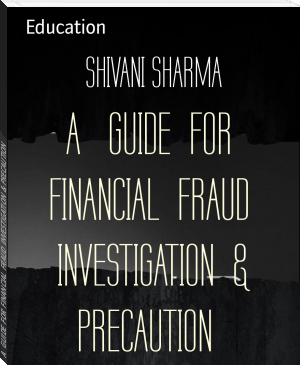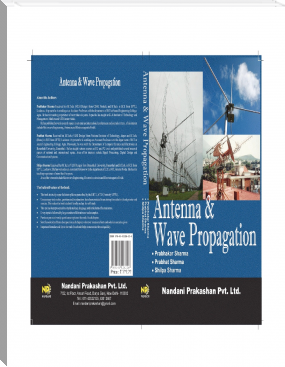A GUIDE FOR FINANCIAL FRAUD INVESTIGATION & PRECAUTION - SHIVANI SHARMA (i love reading books .TXT) 📗

- Author: SHIVANI SHARMA
Book online «A GUIDE FOR FINANCIAL FRAUD INVESTIGATION & PRECAUTION - SHIVANI SHARMA (i love reading books .TXT) 📗». Author SHIVANI SHARMA
employment laws.
A)Australia
There are laws in a number of states. The former NSW Police Commissioner Tony Lauer summed up official government and police attitudes as: "Nobody in Australia much likes whistleblowers, particularly in an organization like the police or the government." Whistleblowers Australia is an association for those who have exposed corruption or any form of malpractice, especially if they were then hindered or abused.
B)Canada:-
Canada (PSIC) provides a safe and confidential mechanism enabling public servants and the general public to disclose wrongdoings committed in the public sector. It also protects from reprisal public servants who have disclosed wrongdoing and those who have cooperated in investigations. The Office's goal is to enhance public confidence in Canada's federal public institutions and in the integrity of public servants. Mandated byThe Office of the Public Sector Integrity Commissioner of the Public Servants Disclosure Protection Act (The Act), PSIC is a permanent and independent Agent of Parliament. The Act, which came into force on April 15, 2007, applies to most of the federal public sector, approximately 400,000 public servants. This includes government departments and agencies, parent Crown corporations, the Royal Canadian Mounted Police and other federal public sector bodies. Not all disclosures lead to an investigation as the Act sets out the jurisdiction of the Commissioner and gives the option not to investigate under certain circumstances. On the other hand, if PSIC conducts an investigation and finds no wrongdoing was committed, the Commissioner must report his findings to the discloser and to the organization's chief executive. Also, reports of founded wrongdoing are presented before the House of Commons and the Senate in accordance with The Act. As of June 2014, a total of 9 reports have been tabled in Parliament. The Act also established the Public Servants Disclosure Protection Tribunal (PSDPT) to protect public servants by hearing reprisal complaints referred by the Public Sector Integrity Commissioner. The Tribunal can grant remedies in favour of complainants and order disciplinary action against persons who take reprisals. PSIC's current Commissioner is Mr. Mario Dion. Previously, he has served in various senior roles in the public service, including as Associate Deputy Minister of Justice, Executive Director and Deputy Head of the Office of Indian Residential Schools Resolution of Canada, and as Chair of the National Parole Board.
C)Jamaica
In Jamaica, the Protected Disclosures Act, 2011 received assent in March 2011. It creates a comprehensive system for the protection of whistleblowers in the public and private sector. It is based on the Public Interest Disclosure Act 1998.
D)India
The Government of India has been considering adopting a whistleblower protection law for several years. In 2003, the Law Commission of India recommended the adoption of the Public Interest Disclosure (Protection of Informers) Act, 2002. In August 2010, the Public Interest Disclosure and Protection of Persons Making the Disclosures Bill, 2010 was introduced into the Lok Sabha, lower house of the Parliament of India. The Bill was approved by the cabinet in June, 2011. The Public Interest Disclosure and Protection of Persons Making the Disclosures Bill, 2010 was renamed as The Whistleblowers' Protection Bill, 2011 by the Standing Committee on Personnel, Public Grievances, Law and Justice. The Whistleblowers' Protection Bill, 2011 was passed by the Lok Sabha on 28 December 2011 and by the Rajyasabha on 21 February 2014. The Whistle Blowers Protection Act, 2011 has received the Presidential assent on May 9, 2014 and the same has been subsequently published in the official gazette of the Government of India on May 9, 2014 by the Ministry of Law and Justice, Government of India.
The company act 2013 and whistle blowing act.
The SFIO, which stands for Serious Fraud Investigation Office, is now a statutory body that has the power to arrest for offences, which are specified as frauds, and this is mentioned under 211 of the Act. There is also responsibility on auditors at to act as whistleblowers and they have to report directly to the Central Government if they have any reason to believe that there is any fraud being committed against the company by any of its officers or any employees. Under the schedule iv of Section 149(8) of the Companies Act 2013 sates about professional conduct and behavior of independent director, it is much more elaborated in part iii of the schedule iv and also ensures that the company has adequate and functioning vigilance mechanism and the interest of the people using it are not harmed. The independent directors are also given the task for reporting any concern over any wrong or suspected fraud or an unethical behavior for the violation of any code or policy of the company. Actions will be taken for such violation.
SEBI and whistleblowing law
SEBI stand for The Securities Exchange Board of India on circular dated 2003 amended its principles on corporate governance, which is given in the standard listing agreement. The annexure I D or clause 49 of the Listing Agreement states that the company will have mechanism for employees to report to the management about any concerns or unethical behavior, any suspected fraud or any kind of violence against company code of conduct or any ethical policies. SEBI and the Whistling blowing policy This mechanism will protect against the victimization of employees who will avail this mechanism will also be provided direct access for the Chairman of the Audit committee in any exceptional case. The existence of such mechanism will be communicated within the company. Though its not mandatory for companies to have whistle blowing policies, but beside that the company will have mandatory requirement to disclose all its report on corporate governance to the extend of the non mandatory practices.
E)Ireland
The government of Ireland committed to adopting a comprehensive whistleblower protection law in January 2012. The bill reportedly covers both the public and private sectors.
F)Netherlands
The Netherlands has measures in place to mitigate the risks of whistleblowing: the whistleblower advice centre (Adviespunt Klokkenluiders) offers advice to whistleblowers, and the Parliament recently passed a proposal to establish a so-called house for whistleblowers, to protect them from the severe negative consequences that they might endure (Kamerstuk, 2013). Dutch media organizations also provide whistleblower support; on 9 September 2013 a number of major Dutch media outlets supported the launch of Publeaks, which provides a secure website for people to leak documents to the media. Publeaks is designed to protect whistleblowers. It operates on the GlobaLeaks software developed by the Hermes Center for Transparency and Digital Human Rights, which supports whistleblower-oriented technologies internationally
G)Switzerland
The Swiss Council of States agreed on a draft amendment of the Swiss Code of Obligations in September 2014. The draft introduces articles 321abis to 321asepties, 328(3), 336(2)(d). An amendment of article 362(1) adds articles 321abis to 321asepties to the list of provisions that may not be overruled by labour and bargaining agreements. Article 321ater introduces an obligation on employees to report irregularities to their employer before reporting to an authority. An employee will, however, not breach his duty of good faith if he reports an irregularity to an authority and a period set by the employer and no longer than 60 days has lapsed since the employee has reported the incident to his employer. The employer has not addressed the irregularity or it is obvious that the employer has insufficiently addressed the irregularity. Article 321aquarter provides that an employee may exceptionally directly report to an authority. Exceptions apply in cases where the employee is in a position to objectively demonstrate that a report to his employer will prove ineffective, where the employee has to anticipate dismissal, where the employee must assume that the competent authority will be hindered in investigating the irregularity, or where there is a direct and serious hazard to life, to health, to safety, or to the environment. The draft does not improve on protection against dismissal for employees who report irregularities to their employer.The amendment does not provide for employees anonymously filing their observations of irregularities.
H)United Kingdom
Whistleblowing in the United Kingdom is subject to the Public Interest Disclosure Act (PIDA) 1998. The Freedom to Speak Up Review set out 20 principles to bring about improvements to help whistleblowers in the NHS, including: Culture of raising concerns – to make raising issues a part of normal routine business of a well-led NHS organization. Culture free from bullying – freedom of staff to speak out relies on staff being able to work in a culture which is free from bullying. Training – every member of staff should receive training in their trust's approach to raising concerns and in receiving and acting on them. Support – all NHS trusts should ensure there is a dedicated person to whom concerns can be easily reported and without formality, a "speak up guardian" . Support to find alternative employment in the NHS – where a worker who has raised a concern cannot, as a result, continue their role, the NHS should help them seek an alternative job. Monitor produced a whistleblowing policy in November 2015 that all NHS organizations in England are obliged to follow. It explicitly says that anyone bullying or acting against a whistleblower could be potentially liable to disciplinary action.
15)Advocacy for whistleblower rights and protection
Many NGOs advocate for stronger and more comprehensive legal rights and protections for whistleblowers. Among them are the Government Accountability Project (GAP), Blueprint for Free Speech, Public Concern at Work (PCaW) and the Open Democracy Advice Center (ODAC). Among the more publicly visible whistleblower activists are Thomas M. Devine of GAP, Cathy James of PCaW, Mark Worth of Blueprint for Free Speech.
16)Modern methods used for whistleblower protections:-
Whistleblowers that may be at risk of those they are exposing are now using encryption methods and anonymous content sharing software to protect their identity. Tor, a highly accessible anonymity network, is one that is frequently used by whistleblowers around the world. Tor has undergone a number of large security updates to protect the identities of potential whistleblowers who may wish to anonymously leak information. Recently specialized whistleblowing software like SecureDrop and GlobaLeaks has been built on top of the Tor technology in order to incentivize and simplify its adoption for secure whistleblowing. Many large companies are using OpenBoard to offer an anonymous way for employees, vendors and suppliers to report any questionable activity. The identity and ownership of OpenBoard forks is not obvious and the security of the service is not apparent.[citation needed] Some examples of companies using OpenBoard are listed below. Code of Conduct Hotline - AdvancePierre® Foods Whistleblower Hotline - Collegium Pharmaceutical, Inc. Contact the Board | Reata Pharmaceuticals Whistleblower and Compliance Hotline - Enerflex Ltd. Lombard Medical, INVESTORS,Corporate Governance
17)Purpose of whistel Blowing:-
To draw attention to unethical, inappropriate or incompetent conduct which has or may have determental effect other for the institution or for those who affected by its functions. Its extent to stiutation where an individual believs that an activity is harmfull while other involve are not are not aware of it or reject the preception that involve. The whistle blower are all prepare to take the responsibilites of their action. Implies the concern of preservation of ethical value which overideas self-preservation. whistle blower open themself to the risk losing pesonal and financial security, counter accusation and alteration and yet they feel compelled to make the disclouser and to stand by it.
18)Type of whistel blowing:-
Internal- Internal whistle blowing is made to someone within the organisation. Personal- Personal whistle blowing is blowing the whistle on offences , here the charge is not againsts the organisation or the system but againsts one individual. Impersonal-The impersonal is external whistel blower.
19)Potential whistle blowing senario:-
Someone within your organisation is pursuing an action that you belives is ethicaly wrong. You belive you know relevant information which is not generaly known. You belive that what you know is correct then if it become public knowelege the course of action would be change. whistle blowing is generaly not about things that you happend to dislike.
20)Things Inside the mind of a whistleblower:-
Awareness- this is wrong i should do something. Agency- Can i make diffrence. Security and investments- should i be the one to say something and if yes who should i say? Support and connectedness- Who can i rely on for help?
21)Characteristic of whistleblower:-
Altruistically (selflesly) motivated. Utilitrarian (Practical). Uninterested in alterating their behavior. Allows own attitude and belives to guide them. Often are well educated and hold proffesstional possition.
22)Stages of whistle blowing:-
Is there a potential whistel blowing senario Seriousness test Reality check. Becoming aware of the big pictuer. Forcing management to recognize theFree e-book «A GUIDE FOR FINANCIAL FRAUD INVESTIGATION & PRECAUTION - SHIVANI SHARMA (i love reading books .TXT) 📗» - read online now
Similar e-books:





Comments (0)